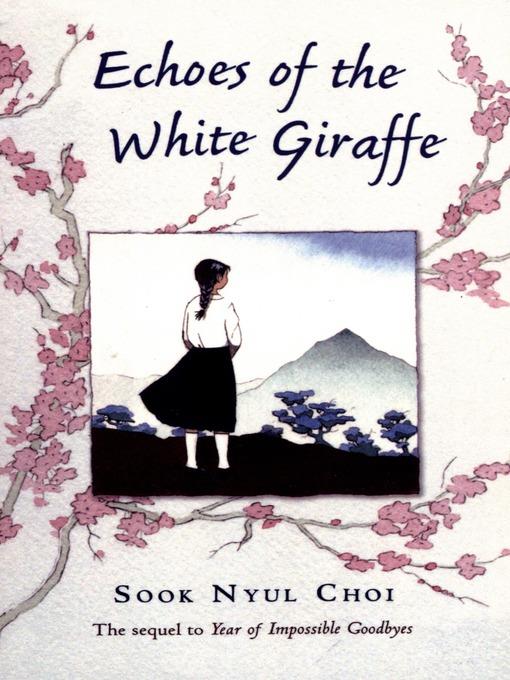
Echoes of the White Giraffe
فرمت کتاب
ebook
تاریخ انتشار
2007
Lexile Score
870
Reading Level
4-5
ATOS
5.7
Interest Level
4-8(MG)
نویسنده
Sook Nyul Choiشابک
9780547995014
کتاب های مرتبط
- اطلاعات
- نقد و بررسی
- دیدگاه کاربران
نقد و بررسی

March 29, 1993
Sookan, the heroine who fled war-torn Seoul with her mother and younger brother in Choi's Year of Impossible Goodbyes , returns in this haunting sequel to tell of life as a refugee in South Korea. Now 15, Sookan tries to establish a sense of normalcy during turbulent times as she attends a makeshift school, worries about her missing father and older brothers, and contends with living in a mountaintop shack on the outskirts of Pusan. But perhaps most confusing of all, Sookan experiences her first romance. She takes comfort in her blossoming yet forbidden friendship with the handsome Junho, sharing with him her hopes and dreams of a happy, peaceful future. The end of the war brings still more upheaval when Sookan and the other refugees make their way back to the North and pick up the rubble of their former lives. Sookan's first-person narrative sustains a level of emotional intensity befitting the often dire events that swirl around her. Choi's graceful writing sews the disparate catastrophes into a satisfying, almost cathartic whole. She has once again succeeded in putting a very human face on a tragic episode of world history. This inspirational work possesses a confidence and quiet triumph with universal reverberations. Ages 10-up.

May 1, 1993
Gr 5-9- -Having narrowly escaped oppression in their native North Korea in Year of Impossible Goodbyes (Houghton, 1991), Sookan and her younger brother were reunited with their mother and their long-missing father and three older brothers. In this, the sequel, the family is again separated, this time by the Korean War. Fleeing falling bombs, Sookan, Inchun, and their mother arrive safely in Pusan, uncertain of the whereabouts of the men. They establish themselves in a shack at the top of a mountain where, along with other refugees, they try to subdue their doubts and grief as they tackle daily routines, face their memories, and dare to hope for a secure future. Singing in the church choir, Sookan, now 15, meets Junho, a young man whose kindness and sympathetic nature deeply impress her. Incredibly tame by today's standards, their friendship leads to a few daring encounters, such as having a photograph taken together and having an unchaperoned conversation. After the truce is signed ending the war, the surviving family members are reunited. Sookan immerses herself in her schoolwork and achieves her goal of attending college in the U. S. While it lacks the action of the first book, this is a poignant story in which Choi speaks with an authentic voice, both in describing a young girl's coming of age and a war-weary nation where, even today, people are uncertain about the fate of family members. Readers will finish the book with a deeper understanding of Korea's past. -Susan Middleton, LaJolla Country Day School, CA

April 1, 1993
Gr. 7-10. This is a disappointing sequel to Choi's autobiographical novel "Year of Impossible Goodbyes", with little of the dramatic immediacy of that acclaimed refugee story. This time the historical facts are just as compelling: Sookan, now 15, has escaped with her mother and younger brother from the bombing of Seoul during the Korean War of the 1950s, and they're living in a rough refugee mountain community in Pusan; as the war ends, they return to rebuild their gracious home in Seoul. However, the first-person narrative is overemotional, and the characterization is thin. Sookan sighs a lot (pensively, sadly, and with resignation), hot tears keep flooding her eyes, and her heart pounds--whether she's remembering the bombs, or helping build a school for the refugees, or listening to a poet, or developing a romantic (and forbidden) relationship with a sensitive young man, who also sighs gently. Despite all the intense talk, the suffering and the joy seem distant, almost abstract, and the romance is patched on. However, the death of Sookan's father is handled with restraint, and readers will get some sense of the war from the civilians' point of view. They also will be moved by Sookan's struggle for independence within the restrictions of her society. ((Reviewed Apr. 1, 1993))(Reprinted with permission of Booklist, copyright 1993, American Library Association.)

























دیدگاه کاربران